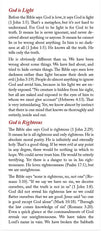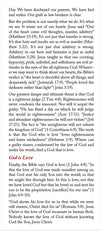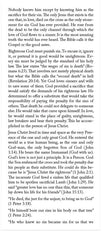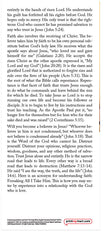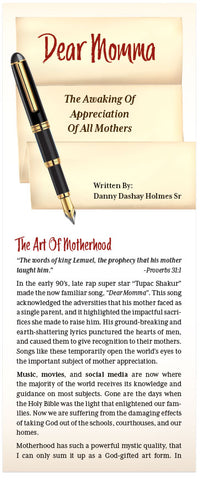God Is Love
Special-Order Folded Flyer Tract
 NOTE: This item is custom-printed to order (click for more details).
NOTE: This item is custom-printed to order (click for more details).
This tract is from our print-on-demand library, and is not kept in stock. Select the options below, and we will custom-print a batch just for you. Because this item is custom-printed, you can add your custom imprint to the back page at no extra cost.
- Estimated shipping date: Thursday, January 29 (Click for more details)
- SKU:
- Discounts: Discount coupons do not apply to this item
- Format: Folded Flyer Tract
- Size: 3.66 x 8.5 inches
- Pages: 6
- Imprinting: Available with 5 lines of custom text
- Version: ESV
- Returns: Because this item is custom-printed to order, it cannot be returned.
Show all item details
The full text of this flyer tract is shown below in the ESV version. (Do you want to print this tract in a different version than the one listed? Contact us and let us know what you're looking for—we may be able to create the alternate version for you at no charge.)
Most people have heard that before. Fewer have experienced its power. It is a life-changing, soul-saving reality whenever this God is personally known. But the fact is most people know him only by hearsay. To them his love is a rumor reported by someone else. It is a theory they hold as a vague hope, but it tends to create more confusion than comfort. If God is love, they say, then why is there so much sorrow and suffering? Yet there is a deep hunger for this to be true. In our most ruthlessly honest moments, we need God to be love.
You will never read of that God in the Koran. The Eastern religions do not speak of a God of love. The government and the education system say nothing about him. This is a revelation of the Bible (1 John 4:8). But the truth that God is love is not the only thing the Bible says about him.
God is Light
Before the Bible says God is love, it says God is light (1 John 1:5). That’s a metaphor, but it’s not hard to understand. For God to be light is for God to be truth. It means he is never ignorant, and never deceived about anything or anyone. It means he cannot lie or be wrong about anything. In him is no darkness at all (1 John 1:5). He knows all the truth. He tells only the truth.
He is obviously different than us. We have been wrong about some things. We have lied about, and tried to hide certain things. The Bible says men love darkness rather than light because their deeds are evil (John 3:19). People do almost anything to ignore God and avoid him, because in his light we are entirely exposed. “No creature is hidden from his sight, but all are naked and exposed to the eyes of him to whom we must give account” (Hebrews 4:13). That is very intimidating. Yet, we know almost by instinct that there is one mind that knows us thoroughly and entirely, inside and out.
God is Righteous
The Bible also says God is righteous (1 John 2:29). It means he is all righteous and only righteous. He is absolute moral purity. He is infinitely and eternally holy. That’s a good thing. If he were evil at any point in any degree, there would be nothing in which to hope. We could never trust him. He would be utterly terrifying. Yet there is a danger to us in his righteousness. He loves righteousness (Psalm 17:1), but we are unrighteous.
The Bible says “none is righteous, no, not one” (Romans 3:10). “If we say we have no sin, we deceive ourselves, and the truth is not in us” (1 John 1:8). God did not reveal his righteous law so we could flatter ourselves that we are good. Jesus said “no one is good except God alone” (Mark 10:18). “Through the law comes knowledge of sin” (Romans 3:20). Even a quick glance at the commandments of God reveals our unrighteousness. We have taken the Lord’s name in vain. We have broken the Sabbath Day. We have disobeyed our parents. We have lied and stolen. Our guilt as law breakers is clear.
But the problem is not merely what we do. It’s what we are. It arises out of our hearts. Jesus said “Out of the heart come evil thoughts, murder, adultery” (Matthew 15:19). It’s not just that murder is wrong. It’s that hate and insults are as evil as murder (Matthew 5:22). It’s not just that adultery is wrong. Adultery in our lusts and fantasies is just as sinful (Matthew 5:28). Jesus taught us that our coveting, hypocrisy, pride, unbelief, and selfishness are evil attitudes in the eyes of the all righteous God. Whatever we may want to think about our hearts, the Bible’s verdict is “the heart is deceitful above all things, and desperately sick” (Jeremiah 17:9). “People loved the darkness rather than light” (John 3:19).
Our greatest danger and ultimate threat is that God is a righteous judge (2 Tim 4:8). Righteousness will never condemn the innocent. Nor will it acquit the guilty. “He has fixed a day on which he will judge the world in righteousness” (Acts 17:31). “Justice and abundant righteousness he will not violate” (Job 37:23). The fact is “the unrighteous will not inherit the kingdom of God” (1 Corinthians 6:9). The truth is that the God who is love “loves righteousness and hates wickedness” (Hebrews 1:9). Where can a guilty sinner, condemned by the law of God and under his wrath, find a God that is love.
God is Love
Finally, the Bible says God is love (1 John 4:8). “In this the love of God was made manifest among us, that God sent his only Son into the world, so that we might live through him. In this is love, not that we have loved God but that he loved us and sent his son to be the propitiation [sacrifice] for our sins” (1 John 4:9-10).
“God shows his love for us in that while we were still sinners, Christ died for us” (Romans 5:8). Jesus Christ is the love of God incarnate in human flesh. Nobody knows the love of God without knowing God the Son, Jesus Christ.
Nobody knows him except by knowing him as the sacrifice for their sin. The only Jesus that exists is the one that, in love, died on the cross as the only atonement for sin God has ever provided. He rose from the dead to be the only channel through which the love of God flows to a sinner. It is the most amazing truth the world has ever heard. The Bible calls it the Gospel or the good news.
Righteous God must punish sin. To excuse it, ignore it, or pretend it is good would be unrighteous. Every sin must be judged by the standard of his holy law. The law states “the wages of sin is death” (Romans 6:23). That involves not merely physical death but what the Bible calls the “second death” in hell (Revelation 20:14). Yet God loves sinners and wills to save some of them. God provided a sacrifice that would satisfy the demands of his righteous law. He determined to offer a substitute that would take the responsibility of paying the penalty for the sins of others. That death he could not delegate to someone else. He would take that curse upon himself. In love, he would stand in the place of guilty, unrighteous, law breakers and bear their penalty. This he accomplished in the person of Jesus Christ.
Jesus Christ lived in time and space as the very Presence of the one and only great God. He entered the world as a true human being, as the one and only God-man, the only begotten Son of God (John 1:14). He bears the name Immanuel (God with us). God’s love is not just a principle. It is a Person. God the Son embraced the cross and took the penalty due his people as their substitute. He could do this because he is “Jesus Christ the righteous” (1 John 2:1). The incarnate God lived a sinless life that qualified him to be spotless sacrificial Lamb (John 1:29). He said “greater love has no one than this, that someone lay down his life for his friends” (John 15:13).
“He died, the just for the unjust, to bring us to God” (1 Peter 3:18).
“He himself bore our sins in his body on that tree” (1 Peter 2:24).
“He who knew no sin became sin for us that we might become the righteousness of God in him” (2 Corinthians 5:21).
Jesus Christ is the incarnate God who is love. His sacrifice satisfies the righteous demands of a holy God. His bearing of the penalty of sin is sufficient to pay the full price and secure the complete forgiveness of everyone for whom he died.
What he did in his death perfectly saves his people. That he was raised from the dead proves he did not fail or fall short of his mission to save his people from their sins (Matthew 1:21). He is alive today. “He is able to save to the uttermost those who draw near to God through him, since he always lives to make intercession for them” (Hebrews 7:25).
This soul-saving, life-changing love is found in no other place (John 14:6). Believe on the Lord Jesus Christ and you will be saved (Acts 16:31). The Bible doesn’t teach that the love of God will save those who don’t accept it as it is offered to them in Christ. God so loved the world that he gave his only begotten Son that whoever believes in him may not perish but have everlasting life (John 3:16). But God demands a response from people. “But to all who did receive him, who believed in his name, he gave the right to become children of God” (John 1:12). You can see that to believe in him is to receive him as he is offered. Remember, he is offered as the great God himself, come into this world as a sinless human being, to bear the sins of his people on the cross and rise again to secure their forgiveness and eternal life. This same Jesus will be the final judge of all men (John 5:22-23).
The God of the Bible promises the blessings of salvation as a free-gift. But faith is more than just agreeing with facts.
Even demons believe the truth in that sense (James 2:19). True faith is a relationship of trust. Trusting Christ involves both giving and receiving. The believer entrusts himself to the person and work of Christ. He gives himself, or commits himself to the effectiveness of Christ’s sacrifice as being his only reason to be forgiven and saved. He places himself entirely in the hands of risen Lord. He understands his guilt has forfeited all his rights before God. He hopes only in mercy. His only trust is that the righteous God who cannot lie has promised salvation to any who trust in Jesus (John 5:24).
Faith also involves the receiving of Christ. The believer takes him by faith to be his own personal substitute before God’s holy law. He receives what the apostle says about Jesus, “who loved me and gave himself for me” (Galatians 2:20). He accepts the risen Christ as the other apostle expressed it, “My Lord and my God” (John 20:28). It is the risen and glorified Lord that is authorized to forgive sins and rule over the lives of his people (Acts 5:31). This is the root of what the Bible calls repentance. Repentance is that facet of faith that trusts Jesus enough to do what he commands and leave behind the sins for which he died. To take Jesus as Lord is to stop running our own life and become his follower or disciple. It is to begin to live by his instructions and trust his teaching. As the Apostle Paul put it, “no longer live for themselves but for him who for their sake died and was raised” (2 Corinthians 5:15).
Will you become a believer in Jesus? “Whoever believes in him is not condemned, but whoever does not believe is condemned already” (John 3:18). That is the Word of the God who cannot lie. Distrust yourself. Distrust your opinions, religious practices, wisdom, goodness, and any other method of salvation. Trust Jesus alone and entirely. He is the narrow road that leads to life. Every other way is a broad road that leads to destruction (Matthew 7:13-14). He said “I am the way, the truth, and the life” (John 14:6). Here is an acronym for understanding faith: Forsaking All I Take Him. This is how you may enter by experience into a relationship with the God who is love.



